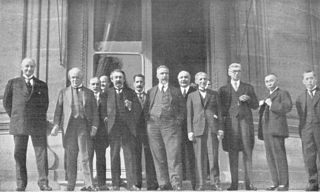 W
WThe 1918 Austro-Hungarian January Strike was a strike which spread across the Austro-Hungarian empire between January 3 and 25, 1918 demanding better living and working conditions and an end to the First World War. It is known as the "Jännerstreik" as opposed to the "Januarstreik" – a similar strike movement which lasted from 25 January to 1 February 1918 in Germany - Jänner being the usual spelling for January in Austria.
 W
WThe British Empire Union (BEU) was created in the United Kingdom during the First World War, in 1916, after changing its name from the Anti-German Union, which had been founded in April 1915. From December 1922 to summer 1952, it published a regular journal.
 W
WThe Calais Conference was a 26 February 1917 meeting of politicians and generals from France and the United Kingdom. Ostensibly about railway logistics for the upcoming allied Spring offensive the majority of the conference was given over to a plan to bring British forces under overall French command. The British Prime Minister David Lloyd George was supportive of the proposal and arranged for the British war cabinet to approve it in advance of the conference, without the knowledge of senior British generals Douglas Haig and Sir William Robertson. The latter were surprised when the proposal was presented by French General Robert Nivelle at the conference. The next day the two generals met with Lloyd George and threatened their resignations rather than implement the proposal. This led to the significant watering-down of the plan with greater freedom given to British commanders. The conference caused mistrust between the British civil and military chiefs and set back the cause of a unified allied command until Spring 1918, when the successful German Spring Offensive rendered it essential.
 W
WThe European War Office was a humanitarian office created by King Alfonso XIII of Spain to help the victims of the First World War, regardless of their allegiance, or whether they were of military or civilian status. The War Office was governed directly by the Private Secretary of the King; it was based in the Royal Palace of Madrid.
 W
WThe Imperial German General Government of Belgium was a German military government and one of three different occupation administrations established in German-occupied Belgium during the First World War.
 W
WThe occupation of Estonia by the German Empire occurred during the later stages of the First World War. On October 11–21, 1917, the Imperial German Army occupied the West Estonian archipelago, consisting of the islands of Saaremaa (Ösel), Hiiumaa (Dagö), and Muhu (Mühn).
 W
WThe General Government of Warsaw was an administrative civil district created by the German Empire in World War I. It encompassed the north-western half of the erstwhile Russian-ruled Vistula Land.
 W
WThe Grimm–Hoffmann affair was a short-lived scandal that threatened Switzerland's neutrality during World War I. Robert Grimm, a socialist politician, travelled to the Russian Republic as an activist to negotiate a separate peace between Russia and the German Empire, in order to end the war on the Eastern Front in the interests of socialism. When the Allies discovered the proposed peace deal, he had to return home. Arthur Hoffmann, the Swiss Federal Councillor who had supported Grimm, had to resign.
 W
WItalian irredentism was a nationalist movement during the late 19th and early 20th centuries in Italy with irredentist goals which promoted the unification of geographic areas in which indigenous peoples considered to be ethnic Italians and/or Italian-speaking individuals formed a majority, or substantial minority, of the population.
 W
WThis article is about Italian military operations in World War I.
 W
WOpposition to World War I included socialist, anarchist, syndicalist, and Marxist groups on the left, as well as Christian pacifists, Canadian and Irish nationalists, women's groups, intellectuals, and rural folk.
 W
WThe Serbian Blue Book is a collection of 52 Serbian diplomatic documents regarding events between 29 June and 6 August 1914, a period including the aftermath of the assassination of Archduke Ferdinand and the beginning of World War I, published by the Government of the Kingdom of Serbia on 18 November 1914. It includes correspondence between Serbian ministers and diplomats, Serbia and Russia, Austria-Hungary, and Germany. It was published in French translation in 1914, and English translation by the British Foreign Office in Collected Diplomatic Documents Relating to the Outbreak of the European War, and also American Association for International Conciliation, in 1915.
 W
WThe Supreme War Council was a central command based in Versailles that coordinated the military strategy of the principal Allies of World War I: Britain, France, Italy, the US and Japan. It was founded in 1917 after the Russian revolution and with Russia's withdrawal imminent. The council served as a forum for preliminary discussions of potential armistice terms as well as peace treaty settlement conditions, and it was succeeded by the Conference of Ambassadors.
 W
WThe Vigilantes was a twentieth-century American publishing syndicate. Their pamphlets and newspapers were distributed with the intention of inspiring patriotism and Allied involvement in World War I. The membership was largely composed of men, who dominated its leadership, though much of the content was produced by women and appeared pseudonymously as the work of "the Vigilantes". A contemporary review noted the "breathless cries of song wrung mostly from the hearts of our women."
 W
WThe Zimmerwald Conference was held in Zimmerwald, Switzerland, from September 5 to 8, 1915. It was the first of three international socialist conferences convened by anti-militarist socialist parties from countries that were originally neutral during World War I. The individuals and organizations participating in this and subsequent conferences held at Kienthal and Stockholm are known jointly as the Zimmerwald movement.